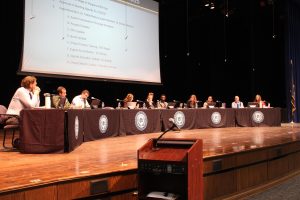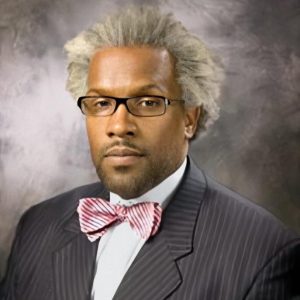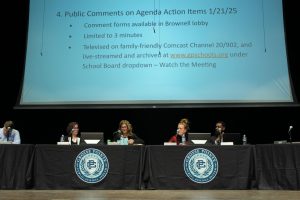About the director: Andrew Fleming
One Acts director Andrew Fleming ’20 discusses flipping roles to directing
January 8, 2020
Imagine a theatrical play. Condense the time frame to 15 to 30 minutes, but still make sure that it encompases an entire story while getting to the point. According to Andrew Fleming ’20, this is what to expect from any One Act performance. In fact, Fleming is working on directing his own to present in the auditorium following numerous other student-directed acts on Feb. 12 and 13.
Having experience on the acting side of productions, Fleming decided to flip roles for a change and conduct his own show.
“I am one of the six directors,” Fleming said. “(The directors) all have completely different One Acts but they are still a part of the same showcase. When a person comes to a One Act show, they will see every single One Act, but they’re all by different directors.”
According to Flemming, One Acts give the student directors a new understanding of how to manage a production.
“We had auditions about a month ago and we all have different shows that we chose on our own. After auditions, we casted people from there. Right now we’re individually working on our own shows and we’ll come together a week before the show and we’ll put the whole thing together,” Fleming said.
Auditions are far from effortless as directors have to make crucial decisions on who to cast, according to Fleming.
“There usually aren’t roles that fit everyone who auditions. That doesn’t mean people weren’t great in the auditions, but the roles we had didn’t fit them as well as they could. I think I can speak for all the directors when I say we all went into the auditions with no specific people in mind , but knowing the specific abilities and skills we were looking for in our roles. When we found actors who fit those, they were perfect for the roles we had,” Fleming said.
According to Fleming, there are benefits to have taken a drama class prior to trying out.
“It helps people not only be more confident when performing in front of people but also it helps people learn the tips and tricks on delivering an honest and effective performance,” Flemming said. “Acting is all about truthfully becoming another person and learning the tips and tricks on how to do that is the best thing an actor can do.”
That being said, it is not necessary to have acting experience before trying out according to Flemming.
“Anyone who wants to try out for any show at South can audition for free. You don’t have to be a part of any performing arts at South. I know people specifically in Pointe Players do it. I also see people who are not involved with theatre that come and audition just because they think it’s something fun and they would like to get involved,” Fleming said. “It’s always open to everyone and we usually get a lot of people from a lot of different parts from South that come to auditions.”
According to Flemming, he chose to direct The Sure Thing by David Ives, a modern-day romance.
“The script is about these two people who meet in a cafe and they start to have a conversation. The problem is that every time they have a conversation and they start to get disinterested in each other or say something that the other person doesn’t like, there is a bell that rings and the conversation starts over. It keeps going over and over until they eventually fall in love,” Fleming said.
It was an option for directors to choose a skit they liked, instead of writing it themselves, according to Fleming.
“I did not write the story but there is one director, Eliz Tazia who wrote the One Act that she is directing,” Fleming said. “It’s an option for directors, but I personally think it would take too long and it’s a lot more work so I just decided to do something that I’ve read before and liked.”
Frequency of practices vary from group to group, according to Fleming, depending mostly on how big the cast is.
“For my show, I only have two actors in it, so we rehearse once a week.It is up to them to memorize their lines but it is up to me to give them deadlines when they should be memorized,” Fleming said. “I have to give them blocking and movements, but I know other directors have a lot more people in their shows so they take more times in the week to rehearse.”
Typically, the costs of producing a One Act are low because of the resources that South already supplies, according to Flemming.
“Fortunately, there is a big prop room at South that we have access to. If they don’t have a specific thing that we need, the director will have that responsibility to get it,” Fleming said. “The biggest thing about One Acts is that they’re all super short and simple so we all chose shows that didn’t require a big specific prop that we would have to buy oursleves.”
In addition, costumes are not paramount either, according to Fleming.
“For my show specifically, I won’t need costumes. It will just be clothes that the actors can bring from home. But for other shows they’ll use the costumes that we have at South. A lot of the One Acts though are pretty much set in present day so we can just use normal clothes and we don’t have to go to far deep into making full blown costumes and stuff like that,” Fleming said.
All in all, having the chance to direct a One Act is an amazing opportunity and would inspire anyone to further a career in the performing arts, according to Flemming.
“I have a lot of acting experience,” Fleming said. “And I am currently auditioning for Musical Theater programs in college so I can continue performing for the rest of my life.”














































































